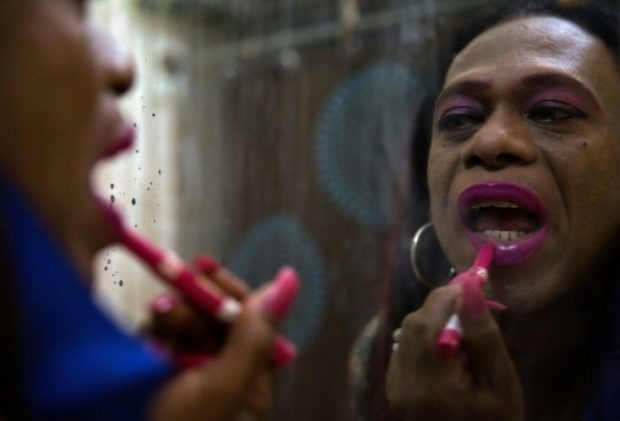
Luna Veras, a transgender sex worker in the Dominican Republic, dresses and makes herself up just as she did before the pandemic struck. But now, she wears a protective mask. Image: AFP/Erika Santelices.
Luna Veras, a transgender sex worker, has struggled to put bread on the table since the 2019 coronavirus disease (COVID-19) first hit the shores of the Dominican Republic in March. Between fear of COVID-19 and a nightly curfew, her business has dropped by 80%.
“I live by sex work. In this time of the COVID-19 pandemic, we trans sex workers are in crisis. The economy has stopped,” said Veras, who lives in a poor neighborhood in Santo Domingo, the capital of the Caribbean country, where prostitution is legal so long as it is voluntary.
The nightly curfew imposed by Dominican authorities as they struggle to slow the spread of the disease has dramatically impacted the sex workers’ lives.
So far, there have been 97,000 confirmed cases of COVID-19 and 1,801 related deaths in this country of a bit less than 11 million inhabitants, according to government figures.
The 47-year-old Veras is HIV-positive and is “panicked” at the idea of contracting the disease, given the drastic effect it could have on her health.
Still, she has continued working, making herself up each day just as she did before the pandemic, except with one difference: she now wears a protective mask over her nose and mouth, which quickly gets stained by her fuchsia lipstick.
The curfew has brought dramatic change. Not only has work dropped off sharply, she now makes appointments only by phone, not in person.
Veras is now a long way from the 10,000 Dominican pesos (about $170 or approx. P8,300) she earned each month before the pandemic. She now cleans houses to get by.
‘Shame’ keeps clients away
Yohana Espinoza, another transgender sex worker, is also HIV-positive. It is impossible for her to find a regular, above-board job, for she was “not declared at birth” and has no birth certificate or legal identity papers.
Yohana Espinoza, an HIV-positive transgender prostitute in the Dominican Republic, is seen in her Santo Domingo apartment on August 14, 2020. Image: AFP/Erika Santelices.
She does not know how to read or write. In her tiny room, under a corrugated tin roof, two fans circulate the torrid air of a Dominican summer. Clients are few.
Twenty-year-old Henely Flores agreed that the nightly curfew — in effect from 7 p.m. to 5 a.m. in Santo Domingo — has had a major impact.
“One day I got changed and went out to work. But I realized that clients were not stopping because it was still daylight and they were ashamed,” she said. Things were so bad she had to ask a friend to take her in because she had no place to live.
With their income plummeting, many sex workers have become dependent on help from charities and international organizations.
“It’s a difficult situation; some people are barely surviving,” said Christian Kingsley, who heads TRANSSA, which provides assistance for transgender people. “We don’t have the means, but we have tried to help them with food and protective equipment against COVID-19 — one less thing they have to spend money on.”
So far, Kingsley said, his group has helped 600 people to register for a government program called “Quedate en casa” (Stay home), which has provided monthly grants of 5,000 Dominican pesos (around $85 or approx. P4,100) to help people buy food since the beginning of the pandemic. CC
RELATED STORIES:
Pandemic brings panic, solidarity to Polish sex industry
The agony of Colombia’s quarantined sex workers
Scared but desperate, Thai sex workers forced to the street